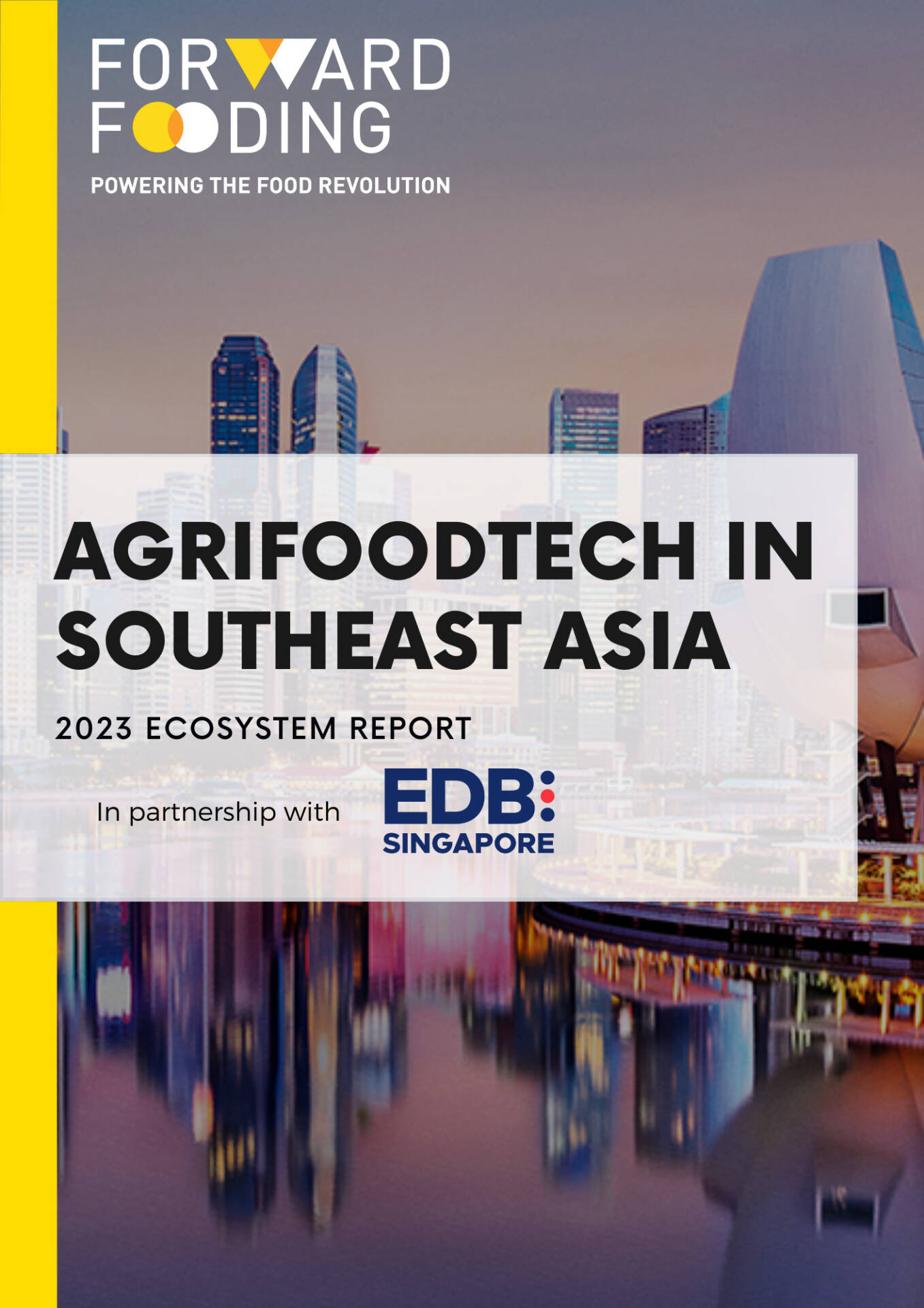FORWARD FOODING
THE BLOG
Feeding the Future: AI’s Role in Sustainable AgriFoodTech Solutions
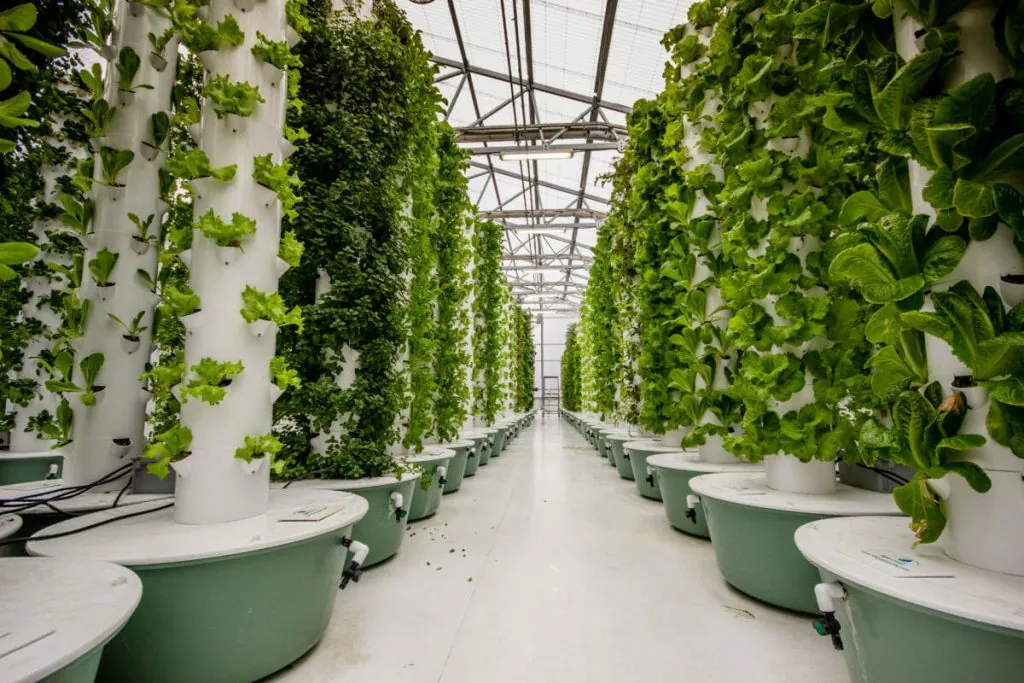
Artificial intelligence (AI) has taken the world by storm, especially most recently with the introduction of ChatGPT and similar applications. But AI is more prevalent in our daily lives than we thought. FoodTech companies all over the world are now using this technology to build a more sustainable and resilient food system.
It’s no news that food production accounts for about one-third of GHG emissions and 70% of water use globally, and almost 90% of deforestation worldwide is due to agricultural expansion. Making our food system more sustainable is imperative to mitigate the effects of climate change on food security and AI, in the AgriFoodTech sector can help us do just that.
AI IN THE SUPPLY CHAIN
AI is all over our food supply chain – in the upstream, midstream, and downstream – helping make food more nutritious while improving the production process.
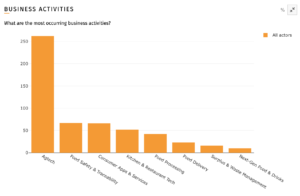
Graph taken from our FoodTech Data Navigator that shows the presence of AI today across a range of business activities.
According to recent industry information from our FoodTech Data Navigator, there are 542 companies using AI; operating mostly in Agtech but also across the whole supply chain, with a total of 10.7B euros raised since 2013.
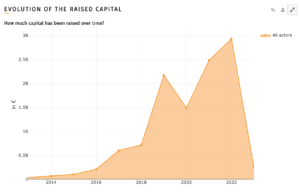
Graph taken from our FoodTech Data Navigator that shows the evolution of capital raised between 2013 – today.
The FoodTech sector covers a multitude of AI applications, ranging from streamlining production processes and minimizing human errors to predicting market trends to improving business strategy. Automation revolutionizes quality defect detection, curbing food waste through the evaluation of food quality. AI even tailors recommendations to individual customer habits, showcasing the vast potential within this industry.
PLANTING NUTRITIOUS CROPS WITH AI
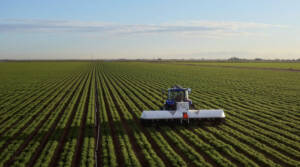
Artificial intelligence has revolutionized farming practices and made agriculture more sustainable as it helps protect crops, boost yield and make urban areas suitable for farming.
A study conducted in 2021 revealed a significant uptick in the adoption of AI technologies within the agricultural sector, with 87% of businesses in the US employing these advanced technologies, up from 74% in 2020. This data underscores the sector’s alignment with other leading industries in embracing innovation and cutting-edge technology. AI-powered insights provide invaluable guidance, enabling the industry to assess the effectiveness of policies and programs.
California-based indoor, vertical farming technology company Plenty is rewriting the rules in agriculture, as it uses AI and robots to manage production and crop growth. The company can monitor and adjust the water, electricity and temperature of its indoor farming setups, which allows growers to cut resource consumption while guaranteeing the amount of produce they will harvest by the end of the season.
Last February, Plenty secured more than $20M in funding to expand its work and scale its R&D capabilities by building the world’s largest and most advanced vertical farming research centre in Wyoming.
Sound Agriculture, another California-based food tech company, is also using AI to create a more agile and resilient food system. That is done by enhancing the natural ability of plants to respond more quickly to changing weather and consumer preferences. Their technology also identifies areas that need fertilization, irrigation, or pesticide treatment, while its vertical agriculture setting boosts crop production using minimal resources.
In 2020, Sound Agriculture was awarded AgTech Startup of the Year for its innovative use of AI-based agricultural technologies, farm management, indoor farming, food quality, and data analytics.
Verdant Robotics is helping scale the growth of specialty crops like carrots, garlic, and onions by using AI and autonomous robots. The company’s farm robot uses precision-application technology to apply nutrients and crop protection products, unlocking additional savings in time, equipment wear and tear, and reducing chemical use by as much as 95%.
Verdant Robotics raised $46.5M in a Series A funding round in November 2022 to scale its advanced robotic technology and accelerate the broad adoption of its regenerative and precision agriculture solutions.
INTELLIGENT MANAGEMENT OF FOOD SYSTEMS

In the food industry, most companies use AI technology to get a better sense of their production process. Let’s take a closer look!
Founded in 2011, San Francisco-based Sight Machine is a manufacturing data platform that uses AI in its factory copilot platform to summarize relevant data about production, as well as generate reports, emails, and charts about the performance of machines, lines and plants across an enterprise.
Sight Machine has raised over $34M in funding to date, with its latest funding round being a $29.4M Series C investment in 2019 led by Korea’s LS Group.
Indian food tech company AgNext leverages AI and machine learning to provide deep-tech-enabled solutions for food quality assessment, monitoring, and management. Its technology can be tailored to help companies reduce costs, streamline processes, increase productivity, and deliver superior customer experiences.
AgNext has raised over $21M in Series A funding to strengthen its presence in the Indian region, expand to international markets and further develop its technology.
Italy-based company Matilde offers businesses with its explainable AI to create better and sustainable products faster that match consumers’ taste while reducing production costs. With Matilde, it would only take two months to put products into market, reduce wasted materials to up to 30% and would only require 30 recipe tests before approval.
Afresh is a food tech company that uses AI to help grocery stores reduce food waste and improve profitability. Afresh is transforming the food industry through its Fresh Operating System, which offers solutions for retail forecasting, inventory, ordering and store operations. Their analytics tool enables companies to compare food waste across retail locations to identify areas of improvement.
Through their technology, partner companies of Afresh see a reduction of food waste by an average of 25% and an increase in revenue growth by 2% to 4%.
CREATING ALT PROTEIN WITH AI
Chilean food tech company NotCo uses its AI-powered platform, Giuseppe, to discover plant-based ingredients to create alternatives to animal-derived products that still have the same taste and appearance.
Since its foundation in 2015, NotCo has already expanded to the US, Brazil, Argentina and Colombia, making it the fastest-growing food tech company in South America. It raised $70M in 2022 to fund a new B2B platform that will enable other companies to use NotCo’s AI technology.
RESTAURANT TECH
Based in California, Bear Robotics provides restaurants with autonomous robots that deliver meals to patrons. Their flagship product, Sevi, is making a wave of positive impact in the restaurant industry by reducing wait times, improving customer experience, and supporting some of the grunt work.
Another California-based food tech company, Miso Robotics, provides autonomous robots that can perform various tasks. Flippy, its flagship product, is the world’s first autonomous robotic kitchen assistant that automates the fry station for quick-service restaurants with speed and precision, while also promoting food safety and quality standards.
London-based Winnow has developed a smart kitchen technology to help commercial kitchens reduce food waste. The company uses AI and computer vision to track what food is being discarded, helping kitchens make improvements and cut waste in half. Winnow claims that its system has already reached and surpassed human levels of accuracy in identifying food being thrown away.
Last June, Winnow secured $10M in Series C funding to further develop its technology. And to date, the company says its solutions saved $174M and cut 217,000 tonnes of CO2e emissions worldwide.
AI IN RETAIL
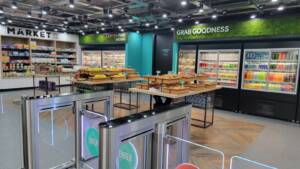
Trax is a retail analytics company that uses AI to provide CPG companies and grocery retailers with real-time insights, ultimately helping them make data-driven inventory strategies and decisions. Some of its partners included Coca-Cola, Nestle, Unilever and P&G.
In April 2021, Trax raised $640M, in a Series E funding round led by SoftBank Vision Fund 2 and BlackRock, to expand its AI-driven technologies and solutions.
AiFi, also a retail analytics company, caters to shoppers as it provides autonomous shopping solutions to retailers. With their technology, which has deployed the most number of autonomous retail stores across the globe, consumers can enjoy checkout-free shopping, promoting ease and quicker service. The company works with the top retailers in the world including Aldi, Carrefour, Compass Group, and Zabka Group.
PERSONAL NUTRITION
California-based company January AI, helps consumers make more informed decisions about their health. Their AI technology closely and continuously monitors consumers’ glucose levels to give real-time insights into their bodies and give meal and activity suggestions to reach their wellness goals.
January AI raised $8.8M in September 2021 to expand its team and accelerate the development of its platform.
SOME KEY TAKEAWAYS OF AI IN THE FOOD INDUSTRY
There is no doubt about the potential AI offers in shaping the future of food and the potential to make a more sustainable food system, and many continue to support the technology despite some concerns when it comes to cost and privacy of data collection.
Key takeaways include:
- Improved efficiency: AI can help streamline workflows and enhance resource allocation.
- Enhanced quality control: AI can also help improve quality control by analyzing vast amounts of data to optimize processes and enhance product consistency.
- Increased food safety: Businesses using AI can ensure food safety as it can monitor equipment conditions, predict maintenance needs, and identify potential hazards.
- Reduced waste: AI can help reduce waste by optimizing inventory management, predicting demand, and identifying areas of waste.
- Improved sustainability: AI can help increase sustainability by optimizing resource use and improving supply chain logistics.
- New product development: AI can also help manufacturers develop new, innovative products by learning about flavor preferences, ingredient combinations, and current trends.
- Improved customer experience: Customer experience can be improved by using AI to predict consumer tastes, patterns, and forecasting how consumers will react to new foods.
Find out more about this FoodTech sector through our Food Data Navigator.
Follow us
Sponsored Articles
9 July 2025
Forward Fooding celebrates the selection of 12 pioneering startups for the inaugural pladis Accelerator Programme. From water lily popcorn to sugar-converting enzymes, these innovations represent the future of snacking, addressing obesity, sustainability, and personalized nutrition through cutting-edge food technology.
21 March 2025
Tim Ingmire, VP of Global Innovation & Technology at pladis, discusses how the snacking giant is supporting early-stage startups in foodtech, health, and sustainability through their accelerator program. Learn about their focus on personalized nutrition, functional foods, and future ingredients to bring innovative, delicious products to consumers worldwide.
8 February 2024
Future Food-Tech returns to San Francisco on March 21-22 Over 1,700 food-tech leaders, from CPG brands, retailers, ingredient providers, [...]
1 February 2023
The 4th edition of FoodTech 500 is taking off and we are excited to partner with NEOM for the third consecutive year to support the best international AgriFoodTech entrepreneurs.
10 February 2022
One of the elements we enjoy the most here at Forward Fooding about working with AgriFoodTech startups is being [...]
